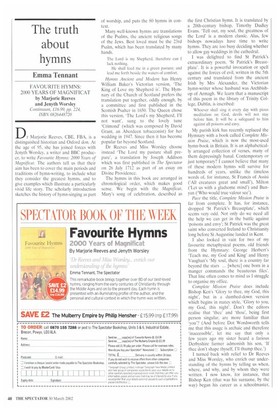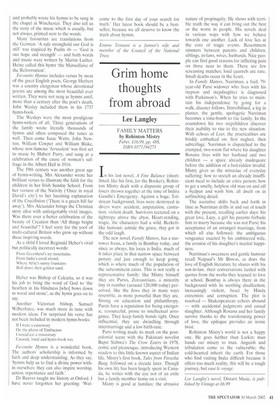The truth about hymns
Emma Tennant
FAVOURITE HYMNS: 2000 YEARS OF MAGNIFICAT by Marjorie Reeves and Jenyth Worsley Continuum, £16.49, pp. 224, ISBN 0826448720 Dr Marjorie Reeves, CBE, FBA, is a distinguished historian and Oxford don. At the age of 95, she has joined forces with Jenyth Worsley, a writer and BBC producer, to write Favourite Hymns: 2000 Years of Magnificat. The authors tell us that their aim has been to cover the main periods and traditions of hymn-writing, to include what they consider the greatest hymns, and to give examples which illustrate a particularly vivid life story. The scholarly introduction sketches the history of hymn-singing as part
of worship, and puts the 80 hymns in context.
Many well-known hymns are translations of the Psalms, the ancient religious songs of the Jews. Best loved must be the 23rd Psalm, which has been translated by many hands.
The Lord is my Shepherd, therefore can I lack nothing.
He shall feed me in a green pasture; and lead me forth beside the waters of comfort.
Hymns Ancient and Modern has Henry William Baker's Victorian version, 'The King of Love my Shepherd is'. The Hymnary of the Church of Scotland prefers the translation put together, oddly enough, by a committee and first published in the Scottish Psalter in 1650. The Queen chose this version, 'The Lord's my Shepherd, I'll not want', sung to the lovely tune 'Crimond' (which was composed by David Grant, an Aberdeen tobacconist) for her wedding in 1947. Since then it has become popular far beyond Scotland.
Dr Reeves and Miss Worsley choose instead The Lord my pasture shall prepare', a translation by Joseph Addison which was first published in The Spectator on 26 July 1712 as part of an essay on Divine Providence.
The hymns in this book are arranged in chronological order, which makes good sense. We begin with the Magnificat, Mary's song of celebration, described as the first Christian hymn. It is translated by a 20th-century bishop, Timothy Dudley Evans. 'Tell out, my soul, the greatness of the Lord' is a modern classic. Alas, few bishops nowadays have time to write hymns. They are too busy deciding whether to allow gay weddings in the cathedral.
I was delighted to find St Patrick's extraordinary poem, 'St Patrick's Breastplate'. It is a powerful invocation or spell against the forces of evil, written in the 5th century and translated from the ancient Irish by Mrs Alexander, the Victorian hymn-writer whose husband was Archbishop of Armagh. We learn that a manuscript of this poem in the library of Trinity College. Dublin, is inscribed: Whoever shall sing it every day with pious meditation on God, devils will not stay before him. It will be a safeguard to him against all poisons and envy.
My parish kirk has recently replaced the Hymnary with a book called Complete Mission Praise, which is now the most-used hymn-book in Britain. It is an alphabetically arranged collection of verses, many of them depressingly banal. Contemporary or just temporary? I cannot believe that many of these modern hymns will survive for hundreds of years, unlike the timeless words of, for instance, St Francis of Assisi (`All creatures great and small'), Milton Met us with a gladsome mind') and Bunyan ('Who would true valour see').
Pace the title. Complete Mission Praise is far from complete. It has, for instance, dropped `St Patrick's Breastplate', which seems very odd. Not only do we need all the help we can get in the battle against 'poisons and envy'; St Patrick was the great saint who converted Ireland to Christianity long before St Augustine landed in Kent.
I also looked in vain for two of my favourite metaphysical poems, old friends from the Hymnary: George Herbert's 'Teach me, my God and King' and Henry Vaughan's 'My soul, there is a country far beyond the stars .,. [where] one born in a manger commands the beauteous files'. That line often comes to mind as I struggle to organise my office.
Complete Mission Praise does include Bishop Ken's 'Glory to thee, my God, this night', but in a dumbed-down version which begins in matey style, 'Glory to you, my God, this night'. Don't the editors realise that 'thee' and 'thou', being first person singular, are more familiar than 'you'? (And before Dot Wordsworth tells me that this usage is archaic and therefore 'inaccessible', let me say that only a few years ago my sister heard a furious Derbyshire farmer admonish his son, 'If thee don't shape thyself, I'll thump thee.') I turned back with relief to Dr Reeves and Miss Worsley, who enrich our understanding of the hymns by telling us when, where, and why, and by whom they were written. I now know, for instance, that Bishop Ken (that was his surname, by the way) began his career as a schoolmaster,
and probably wrote his hymns to be sung in the chapel at Winchester. They also tell us the story of the music which is usually, but not always, printed next to the words.
Many favourites are translations from the German. `A safe stronghold our God is still' was inspired by Psalm 46 — 'God is our hope and strength' — and both words and music were written by Martin Luther. Heine called this hymn `the Marseillaise of the Reformation'.
Favourite Hymns includes verses by most of the great English poets. George Herbert was a country clergyman whose devotional poems are among the most beautiful ever written. They were not sung as hymns until, more than a century after the poet's death, John Wesley included them in his 1737 hymn-book.
The Wesleys were the most prodigious hymn-writers of all. Three generations of the family wrote literally thousands of hymns and often composed the tunes as well. Then come Isaac Watts, John Newton, William Cowper and William Blake, whose now-famous 'Jerusalem' was first set to music by Hubert Parry, and sung at a celebration of the cause of women's suffrage in the Albert Hall in 1916.
The 19th century was another great age of hymn-writing. Mrs Alexander wrote her brilliant verses to illustrate the faith for the children in her Irish Sunday School. From her version of the Nativity (Once in royal David's city') to her haunting explanation of the Crucifixion (There is a green hill far away.), Mrs Alexander brings the Christian story alive with unforgettably vivid images. Was there ever a better celebration of the beauty of Creation than 'All things bright and beautiful'? I feel sorry for the yoof of multi-cultural Britain who grow up without these inspiring words.
As a child I loved Reginald Heber's vivid but politically incorrect words:
From Greenland's icy mountains.
From India's coral strand, Where Afric's sunny fountains Roll down their golden sand.
Heber was Bishop of Calcutta, so it was his job to bring the word of God to 'the heathen in his blindness [who] bows down to wood and stone', as the hymn goes on to say.
Another Victorian bishop, Samuel Wilberforce, was much more in tune with modern ideas. I'm surprised his verse has not been included in modern hymn-books:
If I were a cassowary On the plains of Timbuctoo I would eat a missionary Cassock, band and hymn-book too.
Favourite Hymns is a wonderful book. The authors' scholarship is informed by faith and deep understanding. As they say, 'hymns help us to find a divine power within ourselves; they can also inspire worship, action, repentance and faith.'
Dr Reeves taught me history at Oxford. have never forgotten her greeting: 'Wel
come to the first day of your search for truth.' Her latest book should be a bestseller, because we all deserve to know the truth about hymns.
Emma Tennant is a farmer's wife and member of the Council of the National Trust.



































































 Previous page
Previous page